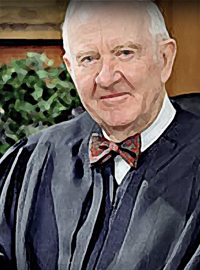| Second Amendment: Justice Stevens’s Proposed Revision is an Admission of Defeat |
 |
|
By Timothy H. Lee
Thursday, April 24 2014 |
If hyper-liberal retired Supreme Court Justice John Paul Stevens gets his way, here’s how the Second Amendment would read: “A well regulated Militia, being necessary to the security of a free State, the right of the people to keep and bear Arms, when serving in the militia, shall not be infringed.” Consider it a liberal lion’s concession of defeat. Specifically, anti-Second Amendment zealots have gone from misrepresenting the Second Amendment’s meaning to advocating its revision. Apparently unsatisfied with over three decades of leveraging the judicial branch to impose his personal political views upon the nation, Stevens is now attempting to get back in the game. In his new book entitled “Six Amendments: How and Why We Should Change the Constitution,” Stevens seeks to resume advocating his discredited judicial philosophy. The passage above, with additions highlighted in bold, would amend the Second Amendment to better reflect his own interpretation. An interpretation rejected repeatedly by the Supreme Court, lower courts, elected officials and enduring majorities of the American electorate. As substantiated exhaustively in the landmark 2008 Supreme Court decision in District of Columbia v. Heller, both the Second Amendment’s text as well as its history protect an individual right to keep and bear arms, not a collective bureaucratic one. In fact, the term “militia” itself doesn’t even mean what Stevens seems to think it means, as detailed within the Heller ruling: “The ‘militia’ comprised all males physically capable of acting in concert for the common defense. The Antifederalists feared that the Federal Government would disarm the people in order to disable this citizens’ militia, enabling a politicized standing army or a select militia to rule. The response was to deny Congress power to abridge the ancient right of individuals to keep and bear arms, so that the ideal of a citizens’ militia would be preserved.” That accords with the right envisioned by Alexander Hamilton, who wrote in Federalist 29, “If circumstances should at any time oblige the government to form an army of any magnitude, that army can never be formidable to the liberties of the people, while there is a large body of citizens … who stand ready to defend their rights and the rights of their fellow citizens.” Accordingly, even Stevens’s choice in terms would be self-defeating, since it employs the term “militia” whose definition doesn’t fit his ends. Moreover, the very fact that the Second Amendment refers to “the people” confirms the individual nature of the right. After all, as the Heller majority noted, “Nowhere else in the Constitution does a ‘right’ attributed to ‘the people’ refer to anything other than an individual right”: “The unamended Constitution and the Bill of Rights use the phrase ‘right of the people’ two other times, in the First Amendment’s Assembly-and-Petition Clause and in the Fourth Amendment’s Search-and-Seizure Clause. The Ninth Amendment uses very similar terminology (‘The enumeration in the Constitution, of certain rights, shall not be construed to deny or disparage others retained by the people’). All three of these instances unambiguously refer to individual rights, not ‘collective’ rights, or rights that may be exercised only through participation in some corporate body.” The pitfalls for Stevens, and those who share his viewpoint, don’t end there. For example, Stevens now asserts that, “Public policies concerning gun control should be decided by the voters’ elected representatives, not by federal judges.” Yet in the same book, Stevens advocates amending the Eighth Amendment to prohibit capital punishment, which majorities of Americans and their elected representatives continue to support. And Stevens certainly doesn’t believe that elected representatives should be trusted to address other divisive issues like abortion or ending “affirmative action.” Accordingly, the only discernible concept Stevens seems to value is that legislatures should be trusted when they align with his political views, but not when they disfavor his political views. Although liberals predictably exalt Stevens’s new campaign, it actually signifies defeat on their part. Rather than persist in claiming that the Second Amendment confers a collective governmental right within a Bill of Rights that otherwise emphasizes individual freedoms, they finally appear to realize that they must change its text in order to reflect their belief. That doesn’t mean that Second Amendment advocates can afford to relent. But it does represent a milestone of well-earned socio-political victory. |
Related Articles : |
























